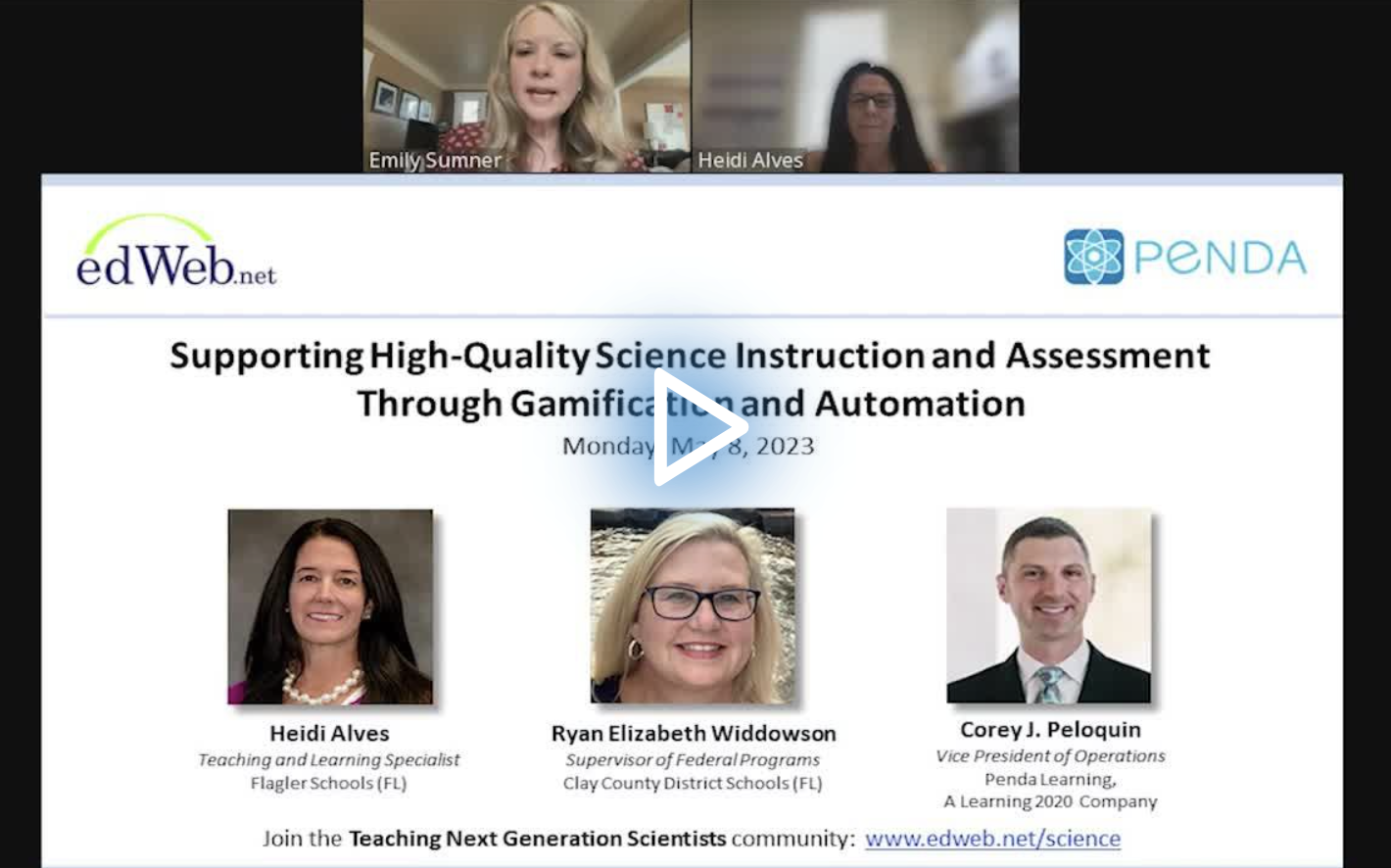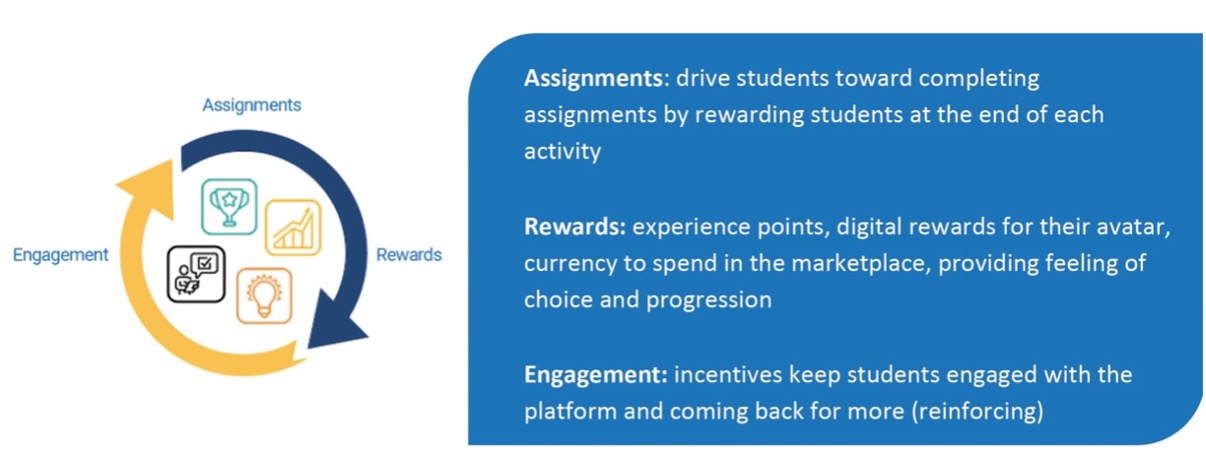Support High-Quality Science Instruction with Gamification and Automation
Watch the Recording Listen to the Podcast
Gamification is the integration of game-based mechanics and design elements into a non-gaming environment to motivate and engage people. While the concept has been around for decades, it is increasingly being used in K-12 education to not only motivate and engage students but also to help them master concepts and content.
The science of gamification and automation and how it is being used to improve the mastery of science concepts and content was the focus of the edLeader Panel, “Supporting High-Quality Science Instruction and Assessment Through Gamification and Automation.”
The Science of Gamification and Learning
At its core, gamification is about using game design principles to motivate people to take action. This can be achieved by incorporating game elements, such as points, badges, leaderboards, challenges, and rewards into an experience. For example, fitness apps use gamification to motivate people to exercise by encouraging them to hit certain goals, like the number of calories burned in a day, the number of steps in a day, or the number of miles run.
According to Corey J. Peloquin, Vice President of Operations at Penda Learning, an online gamified platform to help students in grades 3-10 master science concepts, the platform extracted the “three-step process” from the gaming environment and applied it to the acquisition of science content to create a Gamification Core Loop, which consists of assignments, rewards, and engagement:
He explained that gamification deals with a task at hand—how well students do the task and the immediate benefit or reward they receive from completing that task. While instant gratification is a great motivator, the more important piece of the process is the rapid feedback cycle. Students immediately know how well they did and are then able to unlock new levels (content) to stay engaged. Similar to gaming, it provides a feel-good dopamine effect.
Even when students fall short, the psychology of achievement presses them to try again to get it right so they can advance to the next level. For the students who succeed to the next level, they are motivated to see how far they can go.
Gamification, Automation, and District and State Standards
Combining the “core loop” of gamification with automation has proven to be a powerful tool for school districts in their efforts to ensure that the content students receive is aligned with district and state standards.
In Clay County District Schools (FL), which is a school district of 38,000+ students with a growing number of ELL students, this combined approach has helped them deliver reliable, high-quality science instruction for students in varying grade bands.
Ryan Elizabeth Widdowson, Supervisor of Federal Programs for the district, shared that Clay County is very intentional about its focus on science and that focus starts with standards-based instruction. She said they have a very strong science team that works together to build scope and sequence maps to guide teachers in their lesson planning. They also bring “teachers in to build those maps and create benchmark assessments that will allow them to assess where students are.”
Penda’s automation enables teachers to tailor their lessons within the platform to the district’s scope and sequence, which pairs well with teachers’ pre-planned lessons as well as the pace at which teachers are delivering those lessons.
With the ability to automate the process within the gamification platform, districts can deliver science content that is aligned to both district and state standards—and deliver it to students even if they are in a classroom with a substitute or a teacher who does not have a science background.
On the backend, teachers and administrators receive reports that show them how students are performing, which helps teachers determine which students need remediation either in small group instruction or more intense one-on-one help.
Challenges of Science Instruction
In Flagler Schools (FL), Heidi Alves, Teaching and Learning Specialist, shared that they have experienced similar challenges as other districts in relation to delivering high-quality science instruction. Those challenges include the difficulty of science vocabulary, teacher shortages (especially those with a strong science background), manageable differentiation (for both remediation and enrichment), and student engagement with the content.
The district noticed that the challenge with science vocabulary has historically been across all three tier levels. Penda’s platform includes immersive readers that incorporate picture dictionaries that address Tier 1, Tier 2, and Tier 3 vocabulary words. Additionally, the system can translate the content in multiple languages, which is a huge bonus for teachers trying to help students from diverse linguistic backgrounds.
Alves reinforced the sentiments of Widdowson regarding the benefits of automation for content alignment and delivery, especially as it relates to the consistency of instruction delivery amid teacher shortages. For differentiation and remediation, the reporting features let teachers know who needs help so they can provide small group sessions or individual lessons to help students master the content.
Friendly Competition
For Alves, the gamification feature of schoolwide and districtwide “Penda Challenges” has proven to be the most exciting and rewarding because it solves the issue of student engagement. Throughout the year, students engage in challenges at the classroom, school, and district levels.
She says, “We’ve had huge success with some very friendly competition between classes and between schools, so that, I think, has encouraged that engagement piece.” More importantly, the engagement is purposeful and is aligned with district and Florida state standards.
Learn more about this edWeb broadcast, “Supporting High-Quality Science Instruction and Assessment Through Gamification and Automation,” sponsored by Penda Learning, A Learning 2020 Company.
Watch the Recording Listen to the Podcast
Join the Community
Teaching Next Generation Scientists is a free professional learning community that provides educators and curriculum leaders with a place to collaborate on improving classroom practices for teaching PreK-12 science.
Penda Learning is where science and technology converge in the classroom. Our platform integrates both to make mastery of science concepts possible for every student, no matter where learning takes place. Using Penda Learning, students participate in engaging, gamified science activities and assessments on a platform that makes it easy for teachers to provide exemplary, standards-aligned science instruction in both physical and virtual classrooms. Built by educators for educators, Penda has been recognized as an effective intervention tool by teachers & administrators, in addition to being a high-quality supplemental curricular resource.
Blog post by Ginny Kirkland, based on this edLeader Panel.







Comments are closed.